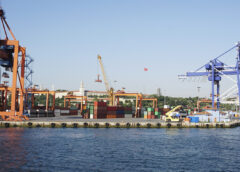Maritime transport is emerging as a fundamental lever in building resilient African trade, as highlighted in UNCTAD’s recent report. This evolution revolves around several strategic axes that strengthen the continent’s capacity to maintain stable trade exchanges despite global disruptions.
Significant Maritime Growth and Flexibility in Crisis
The notable increase in port activities in Africa, marked by a 20% rise in container vessel calls and a 38% increase in tanker calls between 2018 and 2023, demonstrates a strengthening of the continent’s logistics capabilities. This progression creates a solid foundation for more robust and diversified trade exchanges.
The current Red Sea crisis perfectly illustrates the adaptability of African maritime trade. While some East African countries face logistical challenges, other nations like Madagascar, Mauritius, Namibia, and Tanzania have managed to transform this disruption into an opportunity by positioning themselves as alternatives on Asia-Europe maritime routes. This flexibility demonstrates the continent’s ability to maintain its trade flows even in turbulent times.
Innovations in Trade Facilitation
Africa is developing innovative solutions to strengthen its trade resilience:
- Implementation of single customs territories
- Development of one-stop border posts
- Strengthening of maritime security policies These initiatives help reduce transit times and costs, making trade more efficient and more resistant to external shocks.
The African maritime sector is moving towards a more sustainable future with the development of green hydrogen. The identification of eleven countries as potential hubs for green hydrogen storage and distribution opens new perspectives for more ecological and resilient maritime trade.
Emerging Maritime Leadership
Liberia’s rise as the world’s leading ship registry, with 17.3% of the global fleet, symbolizes the emergence of African leadership in international maritime transport. This position strengthens the continent’s ability to influence global decisions affecting maritime trade.
The strengthening of port infrastructure, combined with regional cooperation initiatives such as those led by Mauritius, contributes to creating a more resilient commercial ecosystem. African countries are developing integrated strategies combining maritime security, logistics efficiency, and environmental sustainability.
Maritime transport stands as an essential catalyst for trade resilience in Africa. By combining infrastructure modernization, crisis adaptation, and transition to more sustainable practices, the African maritime sector is building the foundations for more robust and autonomous continental trade. This positive evolution suggests a promising future for African trade, capable of withstanding global disruptions while seizing emerging opportunities






